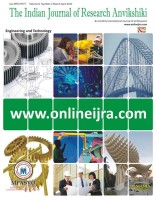Research Paper

Weldability and Special Characteristics of Mild Steel – A Review
Author: *Jyoti Prakash, ** S.P.Tewari, *** Bipin Kumar Srivastava
*Research Scholar, Mechanical Engineering Department, Institute of Technology, Banaras Hindu University, Varanasi-221005
** Professor, Mechanical Engineering Department, Institute of Technology ,Banaras Hindu University,
Varanasi-221005
*** Research Scholar, Mechanical Engineering Department, Institute of Technology, Banaras Hindu University, Varanasi & Senior Section Engineer., D.L.W., Varanasi
*Editor of this Special Issue on Engineering & Technology 2012 and also corresponding author of t
Download PDF
Abstract
weldability is a complicated property, as it encompasses the metallurgical compatibility of the metal or alloy with a specific welding process, its ability to be welded with mechanical soundness, and the capacity of the resulting weld to perform satisfactorily under the intended service conditions. The weldability of steel depends primarily on its hardenability and this, in turn, depends largely on its composition . Steels with carbon content under 0.3% are reasonably easy to weld, while steels with over 0.5% are difficult. The higher the carbon equivalent, the higher the hardenability, the more difficult the steel is to weld, and the more susceptible the microstructure is likely to be to hydrogen cracking. If welding under high restraint, extra preheat may need to be applied. Some high carbon steels and low alloy steels may also need a post weld stress relief or tempering. Carbon has the greatest effect on the hardenability of steel, but other alloying elements may be added to increase its hardenability. The addition effectively reduces the critical cooling rate and the temperature at which the austenite to martensite transformation takes place, making it easier for martensite to form at slower cooling rates. This paper highlights the weldability and some other characteristics of mild steel.